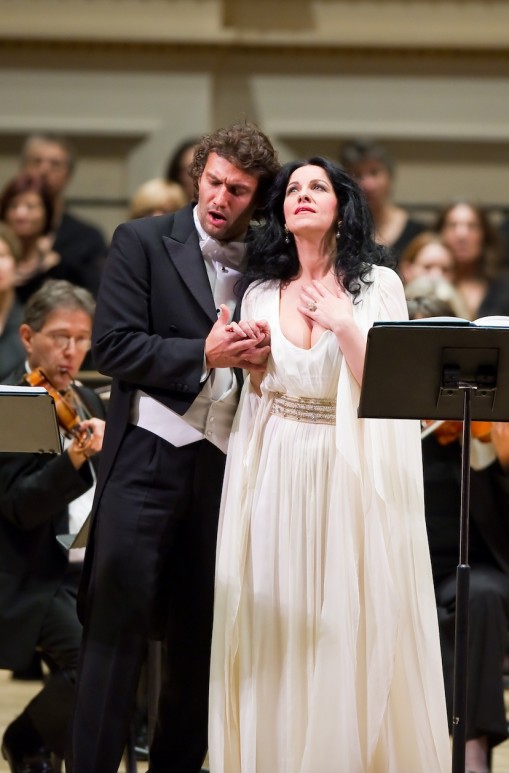Gheorghiu, ageless and in charge with Opera Orchestra of New York’s “Adriana”

Angela Gheorghiu and Jonas Kaufmann in the Opera Orchestra of New York performance of Cilea's "Adriana Lecouvreuer." Photo: Stephanie Berger.
Adriana Lecouvreur, the opera by Francesco Cilea and Arturo Colautti turned 109 years old on November 6, an occasion marked in grand style by Opera Orchestra of New York Tuesday night at Carnegie Hall.
The heroine’s namesake, Adrienne Lecouvreur (1692–1730), was the most celebrated actress of her day, a women who died under mysterious circumstances. In the opera, a poisoned posy (sent by a rival for the tenor’s love) is the improbable cause of her demise. The historical Adrienne suffered insult as well as injury: she was denied a Christian burial because the French Catholic Church of the time had long excommunicated theatre folk, deeming them akin to prostitutes.
Many illustrious sopranos have portrayed the stage Adriana, including Claudia Muzio, Renata Scotto, and Dame Joan Sutherland. The opera’s grateful melodies, comfortable range, and built-in claque for its heroine make it a favorite of sopranos entering their elegant decline, Cilea’s potboiler often proving as flattering as a soft-focus lens. Their love for this bit of faux-Rococo frippery is fierce. In 1937, when Edward Johnson refused to produce Adriana for her, Rosa Ponselle left the Metropolitan Opera.
Opera Orchestra of New York, which champions less familiar works and showcases divas and divos for the greater joy of their admirers, has done well by Adriana. In 2002, the work’s centennial year, OONY’s founder and conductor laureate Eve Queler brought together Aprile Millo, Marcello Giordani, Dolora Zajick, and Anooshah Golesorkhi for a lusty and unforgettable Adriana. Those lucky enough to be there might have thought that performance impossible to beat, but Tuesday’s Adriana at Carnegie Hall came close.
Tenor Giacomo Lauri-Volpi described the legendary Muzio’s voice as made of “tears and sighs and restrained inner fire.” Those words came to mind listening to Angela Gheorghiu as Adriana. Yes, she indulged in her customary who’s-in-charge-here taffy pull with the conductor (she was clearly the boss), and early on her phrasing was as fussy as her handling of her chiffon train.
But her voice is a satiny beam of moonlight, and with it Gheorghiu wrought wonders: a thrilling, full-throated volley of vitriol hurled at her rival the Princesse de Bouillon, a heartbroken filigree spun in Poveri fiori. Her final scene, with her timbre at once radiant with ecstasy and pale with the chill of death, was one for the ages. Frippery Adriana may be, but Gheorghiu transformed it into a queen’s array by means of the alchemy that only a true diva can muster.
As Maurizio, Jonas Kaufmann displayed his intelligence, musicianship, and dark, coppery tone. Noble in intent, Kaufmann’s whisper-soft attacks as Maurizio in La dolcissima effigie were throaty and tortured, but he soon overcame those fleeting difficulties and won repeated (and rapturous) ovations. With easy charm and ringing, heroic sound, he gave an electrifying account of Maurizio’s mettle in battle (Il russo Mencikoff). In the opera’s final scene, he matched Gheorghiu frisson for frisson with his tender, inspired singing.
Casting Ambrogio Maestri, a great Falstaff of our time, as the lovelorn Michonnet is the kind of largesse that makes OONY such a cherished institution. His sound is lush and rolling, though he scaled it down to a gorgeous, buttery-soft mezza voce in Ecco il monologo.
Like the rest of the cast, Maestri sometimes bellowed — because OONY audiences rejoice in decibel tournaments, and because OONY music director Alberto Veronesi occasionally conducted like he was expressly trying to drown out the singers. I understood no more than two words sung by Anita Rachvelishvili as the conniving Princesse de Bouillon (a problem of enunciation, not of audibility). She has a huge, occasionally squally voice and an imposing seconda-donna manner.
Smaller parts were ably sung and played: Nicola Pamio was a deliciously catty Abbé de Chazeuil, and Craig Hart brought unusual dignity to the role of the princess’s soon-to-be cuckolded spouse. As always, OONY cast plucky, gifted young singers in comprimario roles: Lázaro Calderón, Jennifer Feinstein, Alexander Lewis, Zachary Nelson, and Danielle Walker. The youngsters, though, suffered the most from Veronesi’s maladroit balances.
The New York Choral Ensemble under Donald Barnum sang little but admirably, the Opera Orchestra itself played Cilea’s syrupy score with gusto, and the evening belonged to Angela Gheorghiu, as seemingly ageless and divine as the immortal Adrienne.
Opera Orchestra of New York’s season continues with a recital by Chiara Taigi on December 12, Wagner’s Rienzi on January 29, and a concert by Plácido Domingo on March 7. operaorchestrany.org; 212-906-9137.